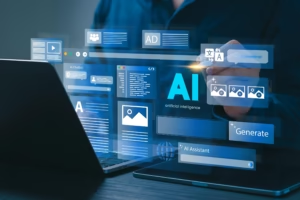Introduction: AI as a Business Game-Changer
Artificial Intelligence (AI) is no longer an emerging trend—it is a core driver of innovation in today’s business landscape. From startups to global enterprises, companies are using AI to enhance productivity, understand customer behavior, improve decision-making, and stay competitive. As digital transformation accelerates, AI is becoming central to modern business strategies.
This article explores how businesses are integrating AI, key trends to watch, and insights into how AI is shaping the future of strategy and operations.
AI in Decision-Making: Speed and Precision
One of the most valuable applications of AI in business is its ability to support smarter and faster decision-making. AI systems analyze vast amounts of data, detect patterns, and provide actionable insights in real time. This eliminates the guesswork and enables leaders to make informed choices with greater confidence.
For example, AI in finance can analyze market trends and client data to advise on investments. In retail, it helps forecast inventory needs based on consumer behavior. This data-driven approach reduces risk and increases efficiency, allowing businesses to act decisively in a fast-changing market.
AI-Powered Customer Experience
Customer expectations are higher than ever. People want fast, personalized, and consistent service. AI helps businesses deliver just that.
Chatbots, virtual assistants, and recommendation engines powered by AI can engage customers 24/7, provide instant support, and offer personalized product suggestions. Businesses that integrate AI in customer service see improved satisfaction and loyalty, as well as reduced costs.
For instance, e-commerce platforms use AI to recommend products tailored to each user’s browsing and buying habits. Banks use AI chatbots to assist with account queries, helping customers without long wait times.
Predictive Analytics and Market Forecasting
Predictive analytics is one of the strongest tools AI brings to the table. By using historical data, machine learning models can forecast market trends, customer behavior, and future demand.
This helps businesses plan more effectively, optimize pricing, and allocate resources wisely. AI-powered forecasting is especially beneficial in industries like supply chain, logistics, and retail—where timing and inventory decisions directly affect profitability.
Companies that can anticipate what’s next gain a competitive edge by being proactive rather than reactive.
Automating Business Operations
Automation through AI reduces manual workload and human error. Businesses can automate processes ranging from data entry and scheduling to supply chain management and fraud detection.
Robotic Process Automation (RPA), combined with AI, is now used in many back-office functions—HR, finance, IT, and customer service. This leads to significant time and cost savings.
By freeing employees from repetitive tasks, companies can redirect their workforce to more strategic and creative roles. This results in both operational efficiency and increased employee engagement.
AI and Personalized Marketing
Marketing strategies have undergone a major transformation due to AI. Machine learning algorithms analyze customer data to deliver personalized marketing campaigns that are far more effective than generic approaches.
AI can identify the best time to send emails, recommend products based on past behavior, and even tailor ads to different customer personas. This hyper-personalization increases engagement and conversion rates while reducing wasted ad spend.
Brands that use AI-driven marketing are seeing higher ROI and stronger customer relationships.
AI and Human Resources: Smarter Talent Management
AI is reshaping HR by simplifying recruitment, enhancing employee experience, and improving workforce planning.
AI tools can scan thousands of resumes to identify the most suitable candidates, reducing hiring time. During interviews, AI-driven platforms can assess communication and behavioral traits.
In employee management, AI is used to predict turnover, gauge employee satisfaction through sentiment analysis, and suggest personalized training paths. This ensures that HR decisions are aligned with company goals and employee well-being.
Cybersecurity and Risk Management
As cyber threats grow more sophisticated, businesses are turning to AI to bolster security. AI systems detect anomalies, flag unusual behavior, and respond to threats faster than traditional security tools.
Machine learning models can continuously learn from new data, improving their ability to detect and prevent fraud, data breaches, and insider threats.
For businesses handling sensitive data—like finance, healthcare, and e-commerce—AI-based security solutions are becoming an essential part of risk management strategies.
Trends in AI Adoption
Several key trends are driving the adoption of AI in business:
-
Democratization of AI: Open-source platforms, cloud-based AI tools, and no-code solutions are making AI accessible to small and medium-sized enterprises, not just large corporations.
-
AI Ethics and Transparency: As AI use grows, businesses are prioritizing ethical considerations like data privacy, bias reduction, and transparency in decision-making algorithms.
-
Edge AI: AI is increasingly being deployed at the edge—closer to data sources like IoT devices—for real-time insights and reduced latency.
-
AI-Driven Innovation: Businesses are using AI not only for optimization but also for innovation—creating new products, services, and revenue streams.
-
Collaboration Between Humans and AI: Instead of replacing humans, AI is being positioned as a tool to augment human intelligence and capabilities.
Challenges and Considerations
Despite its advantages, AI implementation is not without challenges. Common concerns include:
-
Data Quality: AI systems are only as good as the data they are trained on. Inaccurate or biased data can lead to flawed outcomes.
-
Integration Issues: Integrating AI with existing systems and workflows can be complex and costly if not planned properly.
-
Skill Gaps: Businesses may lack in-house expertise to develop, manage, or interpret AI solutions.
-
Cost: While AI is becoming more affordable, initial setup and training costs can be a barrier for some companies.
-
Trust and Ethics: Building trust in AI decisions requires transparency, especially in areas like finance, healthcare, and hiring.
Successful AI integration requires a strategic approach—identifying high-impact use cases, securing quality data, and ensuring team buy-in.
Conclusion: AI as a Strategic Partner
AI is transforming the business world, not just by improving efficiency but by enabling smarter, faster, and more personalized strategies. From customer service and marketing to HR and security, AI is becoming a strategic partner that drives growth and resilience.
The businesses that embrace AI thoughtfully—balancing innovation with ethics—will be the ones that lead in this new era of intelligent enterprise.
Now is the time to understand how AI can serve your goals, experiment with accessible tools, and position your business for a future where artificial intelligence is at the core of every successful strategy.




